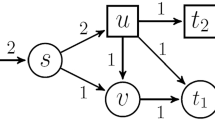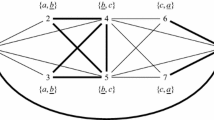Abstract
This paper deals with a matching game in which the nodes of a simple graph are independent agents who try to form pairs. If we let the agents make their decision without any central control then a possible outcome is a Nash equilibrium, that is a situation in which no unmatched player can change his strategy and find a partner. However, there can be a big difference between two possible outcomes of the same instance, in terms of number of matched nodes. A possible solution is to force all the nodes to follow a centrally computed maximum matching but it can be difficult to implement this approach. This article proposes a tradeoff between the total absence and the full presence of a central control. Concretely, we study the optimization problem where the action of a minimum number of agents is centrally fixed and any possible equilibrium of the modified game must be a maximum matching. In algorithmic game theory, this approach is known as the price of optimum of a game. For the price of optimum of the matching game, deciding whether a solution is feasible is not straightforward, but we prove that it can be done in polynomial time. In addition, the problem is shown APX-hard, since its restriction to graphs admitting a perfect matching is equivalent, from the approximability point of view, to vertex cover. Finally we prove that this problem admits a polynomial 6-approximation algorithm in general graphs.














Similar content being viewed by others
Notes
We suppose that every vertex has at most one degree-1 neighbor. If not, then we can discard some degree-1 vertices of the graph without modifying the size of a maximum matching. In addition, it is not difficult to see that mfv remains the same on the reduced instance.
References
Roughgarden, T., Tardos, É.: How bad is selfish routing? J. ACM 49, 236–259 (2002)
Koutsoupias, E., Papadimitriou, C.H.: Worst-case equilibria. Comput. Sci. Rev. 3, 65–69 (2009)
Papadimitriou, C.H.: Algorithms, games, and the internet. In: Proceedings of the 33rd Annual ACM Symposium on Theory of Computing, STOC ‘01, pp. 749–753. ACM, New York, NY, USA (2001). doi:10.1145/380752.380883
Christodoulou, G., Koutsoupias, E., Nanavati, A.: Coordination mechanisms. Theory Comput. Sci. 410, 3327–3336 (2009)
Kaporis, A.C., Spirakis, P.G.: Stackelberg games: the price of optimum. In: Kao, M.Y. (ed.) Encyclopedia of Algorithms. Springer, Berlin (2008)
Korilis, Y.A., Lazar, A.A., Orda, A.: Achieving network optima using stackelberg routing strategies. IEEE/ACM Trans. Netw. 5, 161–173 (1997)
Roughgarden, T.: Stackelberg scheduling strategies. SIAM J. Comput. 33, 332–350 (2004)
Kumar, V.S.A., Marathe, M.V.: Improved results for stackelberg scheduling strategies. In: Widmayer, P., Ruiz, F.T., Bueno, R.M., Hennessy, M., Eidenbenz, S., Conejo, R. (eds.) Lecture Notes in Computer Science. Springer, Berlin (2002)
Swamy, C.: The effectiveness of stackelberg strategies and tolls for network congestion games. In: Bansal, N., Pruhs, K., Stein, C. (eds.) SODA, pp. 1133–1142. SIAM, Philadelphia (2007)
Fotakis, D.: Stackelberg strategies for atomic congestion games. Theory Comput. Syst. 47, 218–249 (2010)
Sharma, Y., Williamson, D.P.: Stackelberg thresholds in network routing games or the value of altruism. Games Econ. Behav. 67, 174–190 (2009)
Bonifaci, V., Harks, T., Schäfer, G.: Stackelberg routing in arbitrary networks. Math. Oper. Res. 35, 330–346 (2010)
Nash, J.: Non-cooperative games. Ann. Math. 54, 286–295 (1951)
Aumann, R.J.: Acceptable points in general cooperative n-person games. Contrib. Theory Games 4, 287–324 (1959)
Andelman, N., Feldman, M., Mansour, Y.: Strong price of anarchy. Games Econ. Behav. 65, 289–317 (2009)
Manoussakis, Y.: Alternating paths in edge-colored complete graphs. Discret. Appl. Math. 56, 297–309 (1995)
Hochbaum, D.S.: Approximation Algorithms for NP-Hard Problems. PWS Publishing Company, Boston, MA (1996)
Dinur, I., Safra, S.: On the hardness of approximating minimum vertex cover. Ann. Math. 162, 439–485 (2005)
Khot, S., Regev, O.: Vertex cover might be hard to approximate to within 2-epsilon. J. Comput. Syst. Sci. 74, 335–349 (2008)
Alimonti, P., Kann, V.: Some apx-completeness results for cubic graphs. Theory Comput. Sci. 237, 123–134 (2000)
Garey, M., Johnson, D.S.: Computers and Intractability: A Guide to the Theory of NP-Completeness. Freeman, W. H (1979)
Gale, D., Shapley, L.S.: College admissions and the stability of marriage. Am. Math. Mon. 69, 9–15 (1962)
Acknowledgments
We would like to thank the anonymous reviewers for their valuable comments and suggestions.
Author information
Authors and Affiliations
Corresponding author
Additional information
Part of the results given in this article were presented at the conference SAGT 2011 (B. Escoffier, L. Gourvès, J. Monnot: The Price of Optimum in a Matching Game. SAGT 2011: 81–92).
Rights and permissions
About this article
Cite this article
Escoffier, B., Gourvès, L. & Monnot, J. The Price of Optimum: Complexity and Approximation for a Matching Game. Algorithmica 77, 836–866 (2017). https://doi.org/10.1007/s00453-015-0108-5
Received:
Accepted:
Published:
Issue Date:
DOI: https://doi.org/10.1007/s00453-015-0108-5




